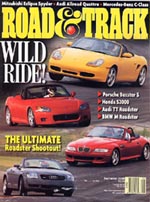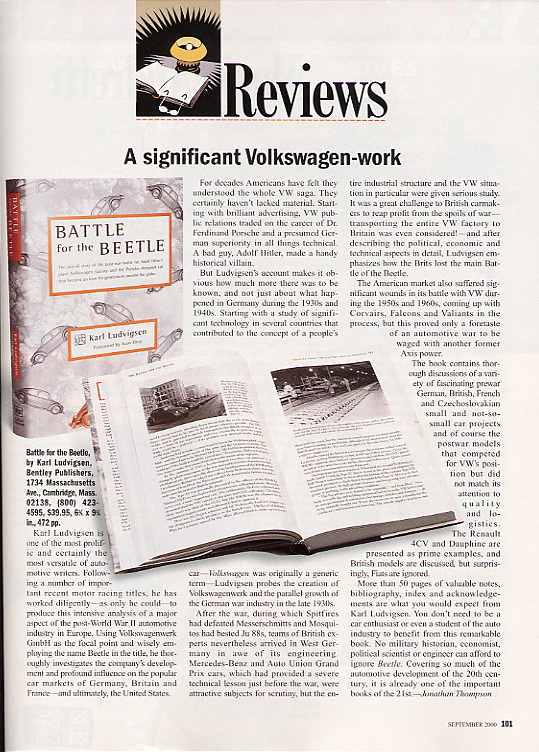|
|
Battle for the Beetle
Price: $64.95
|

Road & Track - September 2000
A significant Volkswagen-work
Karl Ludvigsen is one of the most prolific and certainly the most versatile of automotive writers. Following a number of important recent motor racing titles, he has worked diligently - as only he could - to produce this intensive analysis of a major aspect of the post-World War II automotive industry in Europe. Using Volkswagenwerk GmbH as the focal point and wisely employing the name Beetle in the title, he thoroughly investigates the company's development and profound influence on the popular car markets of Germany, Britain, and France - ultimately, the United States.
For decades Americans have felt they understood the whole VW saga. They certainly haven't lacked material. Starting with brilliant advertising, VW public relations traded on the career of Dr. Ferdinand Porsche and a presumed German superiority in all things technical. A bad guy, Adolf Hitler, made a handy historical villain.
But Ludvigsen's account makes it obvious how much more there was to be known, and not just about what happened during the 1930s and 1940s. Starting with a study of significant technology in several countries that contributed to the concept of a people's car - Volkswagen was originally a generic term - Ludvigsen probes the creation of Volkswagenwerk and the parallel growth of the German war industry in the late 1930s.
After the war, during which Spitfires had defeated Messerschmitts and Mosquitos had bested Ju 88s, teams of British experts nevertheless arrived in West Germany in awe of its engineering. Mercedes-Benz and Auto Union Grand Prix cars, which had provided a severe technical lesson just before the war, were attractive subjects for scrutiny, but the entire industrial structure and the VW situation in particular were given serious study. It was a great challenge to British carmakers to reap profit from the spoils of war - transporting the entire VW factory to Britain was even considered! - and after describing the political, economic and technical aspects in detail, Ludvigsen emhasizes how the Brits lost the main Battle of the Beetle.
The American market also suffered significant wounds in its battle with VW during the 1950s and 1960s, coming up with Corvairs, Falcons and Valiants in the process, but this proved only a foretaste of an automotive war to be waged with another former Axis power.
The book contains thorough discussions of a variety of fascinating prewar German, British, French and Czechoslovakian small and not-so-small car projects and of course the postwar models that competed for VW's position but did not match its attention to quality and logistics. The Renault 4CV and Dauphine are presented as prime examples, and British models are discussed, but surprisingly, Fiats are ignored.
More than 50 pages of valuable notes, bibliography, index and acknowledgements are what you would expect from Karl Ludvigsen. You don't need to be a car enthusiast or even a student of the auto industry to benefit from this remarkable book. No military historian, economist, political scientist or engineer can afford to ignore Beetle. Covering so much of the automotive development of the 20th century, it is already one of the important books of the 21st.

Article from and courtesy of Road & Track - September 2000
![[B] Bentley Publishers](http://assets1.bentleypublishers.com/images/bentley-logos/bp-banner-234x60-bookblue.jpg)

